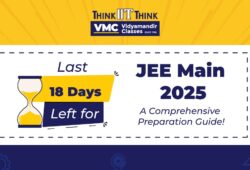Strategic Approach to Revision for JEE Main 2025
 Posted On
Posted On
JEE Main is considered to be one of the most challenging engineering entrance exams in India. Every year, lakhs of aspiring students appear for the exams. While preparation requires a strong foundation of concept understanding, there is a greater difference between revision strategies. An effective and well-structured plan for revision helps you not just go through the syllabus once again but improves retention, increases time management capabilities, and most importantly, it boosts confidence. Let’s learn how a smart approach to revising can prove to be just the difference a JEE Main aspirant requires.
1. Importance of Revision
Revision is not reading your notes again or solving a few problems. It is about shaping what you have known so far and identifying where it needs improvement. Key benefits include:
• Retention: Revision of topics on periodical helps lock concepts in your memory.
• Confidence Boost: A well-revised syllabus ensures you are better prepared to reduce the anxiety of exams.
• Error Identification: A revision also helps spot one’s mistakes and gaps in understanding that might have otherwise remained unnoticed.
• Time Management: Revision practice questions help to speed up and get things right.
2. Make a Revision Plan
A proper plan is the backbone of proper revision. Here’s how to make one:
• Divide the Syllabus: Divide the syllabus into manageable portions—Physics, Chemistry, and Mathematics. Prioritize based on weightage and your comfort level with the topics.
• Set Clear Goals: Allocate specific topics or chapters to each day, ensuring coverage of the entire syllabus.
• Buffer Time: This is for unexpected delays or to focus more on weak areas.
• Mix Topics: Instead of spending hours on one subject, plan a mix of subjects each day to avoid monotony.
3. Use Active Revision Techniques
Passive techniques like reading notes or highlighting text are less effective than active techniques. Adopt the following strategies:
• Practice Questions: Work on problems ranging from past year papers to mock tests.
• Teach Others: Explaining concepts to a peer or even to yourself strengthens your understanding.
• Make Summary Notes: Write flashcards or write down the points in brief summary form for rapid revision.
• Mind Mapping: Visualize relationships by creating diagrams or flowcharts of concepts.
• Self-Testing: Test yourself repeatedly on key formulas, reactions, and concepts.
4. Focus on High-Weightage Topics
JEE Main also has some areas that have greater weightage. Although it’s true that every area needs to be covered, try to focus extra on these ones:
• Physics: Mechanics, Electrodynamics, Thermodynamics, Optics, and Modern Physics.
• Chemistry: Organic reactions, Coordination Chemistry, Thermodynamics, and Mole Concept.
• Mathematics: Calculus, Algebra, Coordinate Geometry, and Probability.
Focusing more on these topics can help to gain the best score while building a strong hold on the foundation.
5. Mock Tests: The Ultimate Tool
Mock tests are a game-changer when it comes to revision. They simulate the actual exam environment, helping you practice under timed conditions. Key tips:
• Analyze Performance: Post-test analysis is crucial. Identify your strengths and weaknesses to adjust your revision plan accordingly.
• Time Management: Develop a strategy for how much time to allocate to each section.
• Adapt Strategies: Experiment with different methods of attempting the paper to find what works best for you.
6. Revise Weak Areas
Use your mock test results and self-assessment to identify weak areas. Spend more time on these topics, but don’t forget your strong areas. Techniques to improve weak areas are:
• Video tutorials to look at the topic from a different angle.
• Revision of NCERT textbooks to clarify basic concepts.
• Topic-wise questions to boost confidence.
7. Maintain Consistency with NCERT
For JEE Main, NCERT books are a must, especially for Chemistry. Keep revising from NCERTs on all days:
• Rehearse through Key Points: Read through all the underlined or highlighted texts for a speed revision.
• Practice Inorganic Chemistry: Focus strongly on the material in NCERT, as numerous questions are very directly based thereon.
• Confirm Formulas and Concepts: Accurate and comprehensive understanding.
8. Time-Management During Revisions
Maintaining a Balance in the Timings of Different Subjects
Essential tips-
• 50/10 Rule: Keep studying for 50 minutes then take a rest for 10 minutes to regenerate.
• Reduced Social Media: Do not indulge in unwanted surfing on your study time.
• Set a Schedule: Follow a specific schedule for each day and cultivate discipline.
9. Preserve Mental and Physique
Performing depends equally on one’s health and how well one studies. Do these:
• Proper Sleep: Minimum 7 to 8 hours of sleep at night
• A Balanced Diet: Eat food with nuts, fruits, and lots of leafy greens.
• Regularity of Workout: This releases stress and trains the mind.
• Relaxation Techniques: Meditate or practice deep breathing to overcome anxiety.
10. Last-Minute Revision Tips
As the date of the exam draws near, do the following:
• Don’t Take New Topics: Revise only what you know.
• Formulas and Short Notes: Go through your summary sheets and flashcards.
• Exam Conditions: Solve full-length papers in one sitting to build stamina.
• Positive Attitude: Trust your preparation and avoid unnecessary comparisons with peers.
Conclusion
This bridge between preparation and performance is, therefore, strategic revision. Thus, proper planning, concentration on high-yield topics, and the use of active learning techniques will improve the chances of acing JEE Main 2025. So, don’t forget: Consistency, discipline, and attitude are what keep you going. With the correct revision strategy, you can definitely face the examination with confidence and take a good step toward the realization of your engineering dreams. Good luck!





